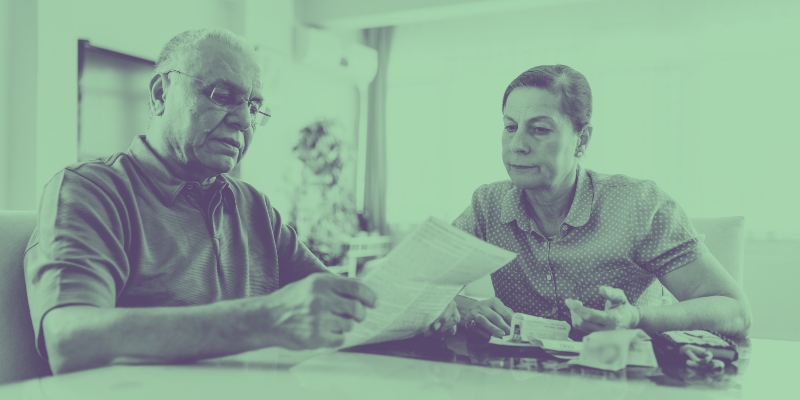
Half of the people we help with debt advice are in a ‘negative budget’, where their income can’t cover their essential costs.
At Citizens Advice, our advisers see the impact of government policies on people’s lives every day.
One adviser recently helped a single mother with a long-term health condition who needed an emergency food bank referral. Her income had been spent covering her essential bills — like energy, rent, water, Council Tax and essential travel (like taking her son to school and getting to the shops) — leaving little left over to pay for food.
Thankfully, she had recently received the £300 Cost of Living payment from the Government, which was paid to households on means-tested benefits. This went straight towards paying back some debts and topping up her energy prepayment meter for the month — keeping her and her son warm while the temperatures dropped.
Had she not received this, her situation would have been much worse.
We can see the impact of the Cost of Living payments clearly in our data. Every time these payments hit people’s bank accounts, we’ve seen a drop in the number of people we were helping with a food bank referral each day.
You can see how in November, the payments halted the rising trend we had seen since the summer, and which we would have expected to continue in November.
But sadly the impact of the Cost of Living payments on our food bank referral data has always been short-lived, with a temporary drop in numbers followed by a rise the following month.
Data from the first week of December shows just how short-lived this was.
The number of people we helped with food bank referrals last week (W/C 4th December) was the highest since December last year — and the second highest week on record. Meanwhile, we helped a record number of people with emergency charitable support.
A deeper problem
Ultimately, while hugely helpful, one-off payments like these are never going to solve the deeper problem that’s driving people into crisis: being in a negative budget. That’s when your monthly income is simply not enough to cover your monthly essential costs.
As long as the Cost of Living payments only temporarily increase people’s incomes, and don’t permanently reduce people’s costs, then they will only provide temporary relief to this growing problem.
Half of the people we help with debt advice are now in a negative budget — up from just over one-third in 2019.
We know that it’s not only the people we help who are in a negative budget — we suspect that it affects millions. That’s why our analysts have developed a tool to track the number of households in a negative budget across the whole country — and which policies can help the most people out of it. More on that in the coming months.
So, what’s driving people into a negative budget?
It’s mainly 3 things:
1.Benefit payments for working-age people have not kept up with the cost of living. While benefits were uprated by the Consumer Price Index (CPI) inflation last year, and will be again next year — their value has never recovered from being frozen between 2015 and 2020. If benefits had kept pace with inflation since 2015, then a Universal Credit payment for a typical family of four would now be £80.72 higher per month and £968.64 higher per year.
Then, even if benefits had kept pace with CPI inflation, there’s the problem that this measure doesn’t accurately reflect the real impact of price rises for people on low incomes. We think this is better captured by the Household Costs Index. For more detail on that, see this blog from our Head of Policy, Morgan Wild.
2. Energy costs are still at historically high levels. While typical energy bills have fallen from the peak of last winter, they are still more than 50% higher than at this point in 2021.
And, as households aren’t receiving the £400 discount off energy bills this year, the Resolution Foundation estimated that one-third of households — and nearly half of the poorest households — would be paying more for their energy this winter than the last.
The consequences of unaffordable energy bills for the people we help are record levels of average energy debt and record numbers of people who can’t afford to top up their prepayment meters — putting them at risk of being cut off their gas and electricity this winter.
In 2022, we helped more people who couldn’t afford to top up their prepayment meters than in the whole of the previous 10 years combined. So far in 2023, we’ve already helped nearly as many in this situation as in 2022 and 2021 combined.
3. High and rising private rent and mortgage costs are driving people into the red. Private rents in the UK have been unaffordable for many people on low incomes for years. This has got worse as private rents have risen by an average of 6.1% across the country last year. Private renters who we help with debt advice pay an average of £662 per month in rent, so a 6.1% increase is more than a £40 per month rise.
This wouldn’t have been so bad if the level of housing benefit support (through Housing Benefit or Universal Credit — Housing Element) also increased to cover higher rents. But the Local Housing Allowance, which sets the level of housing benefit support, has been frozen since 2020, while rents have gone up.
This means that, among the people we help with debt advice, private renters on Universal Credit have a growing shortfall between the level of housing support they get and their rent each month. This monthly shortfall has grown from £98 in 2019–20 to £157 this year — and, as this shortfall needs to be covered using the rest of their income, this leaves less and less money left for other essentials.
Then there is the problem of sky-high mortgage costs. Among the people we help with debt advice, monthly mortgage payments have risen by £155 per month in the last 2 years (from £429 to £584) — a 36% increase.
The combination of rising private rents and mortgage payments, and lack of sufficient support for these groups, has plunged the average private renter and mortgage holder we help with debt advice deep into the red each month.
At the start of 2019–20, mortgage holders had £61 spare each month after paying for their essentials — now they are £108 in the red. Private renters have always struggled, but now it’s much worse — falling from being £1 in the red to £54 in the red.
What are the solutions?
In the Autumn Statement, the Chancellor announced that, next April, benefits will be uprated by CPI inflation and the Local Housing Allowance will be restored to the 30th percentile of local market rents. Both of these will definitely help — and they need to happen every year, without fail.
One key thing was missing, though: further targeted support on energy bills. We know that we’re helping record numbers of people who can’t afford to top up their prepayment meter; the people we help are in record levels of energy debt; and, in the absence of government support, many are paying more for their energy this winter than last.
As an emergency measure to help people through this winter, the £150 Warm Home Discount needs to be increased. Beyond that, while energy bills are set to stay high for the next decade, they need to be made permanently affordable for people on low incomes. We’ve outlined how a system of targeted energy bill support can achieve that.
Looking to the long-term, it’s clear that a solution needs to be found to make housing costs more affordable for people on low incomes. Addressing the shortage of available social housing — with affordable rents and secure tenancies — has to be a big part of this.
Blog by Jonny Tatam-Hall, We are Citizens Advice


